A Journey of Learning and Insight

A Journey of Learning and Insight
— An Autobiography of Master Sheng Yen (聖嚴法師學思歷程) Download
From the time I realized that sutras are used to provide knowledge and methods to purify society and the human mind, I felt lament. I thought, “The Dharma is so good, yet so few people know about it, and so many people misunderstand it.” Thus, I vowed to use contemporary ideas and language to introduce to others the true meaning of the Dharma that was forgotten, and to revive the spirit of Shakyamuni Buddha.
Autobiography

Footprints in the Snow
In this landmark memoir, a renowned Buddhist master traces his spiritual journey against the panoramic story of China from the pre-Communist era to the present.
Master Sheng Yen has devoted much of his life to spreading the teachings of Chinese Buddhism—a practice that antedates the more familiar Japanese and Tibetan traditions—throughout the world. He became known in the United States after he began founding meditation centers here in 1980. Now in his late seventies, he tells the remarkable story of his life and spiritual education in Footprints in the Snow. From descriptions of the private world of Buddhist masters to first-hand accounts of Chinese history, it is a rare document that is both an important look at China’s past and a compelling spiritual journey across a lifetime. Sheng Yen’s story is of a life lived in the last years of the Republic of China, the Sino-Japanese War, and the founding of the People’s Republic of China. An eye-opening slice of modern history as well as an authoritative introduction to an ancient religious tradition, Footprints in the Snow will appeal to spiritual seekers, travelers who want to understand more about China, or anyone looking for a fascinating story.
Chan Practice
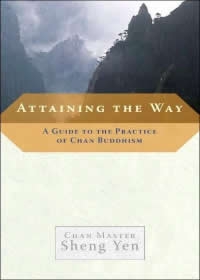
Attaining the Way
This is an inspiring guide to the practice of Chan (Chinese Zen) in the words of four great masters of that tradition. It includes teachings from contemporary masters Xuyun and Sheng Yen, and from Jiexian and Boshan of the Ming Dynasty (1368–1644). Though the texts were written over a period of hundreds of years, they are all remarkably lucid and are perfect for beginners as well as more advanced practitioners today. All the main points of spiritual practice are covered: philosophical foundations, methods, approaches to problems and obstacles—all aimed at helping the student attain the way to enlightenment.
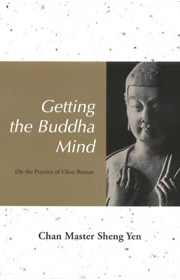
Getting the Buddha Mind
"In meditation, we go from phenomena to emptiness by progressively voiding our mental states". This sentence from Getting the Buddha Mind succinctly summarizes the purpose of practicing Chan meditation. What does it mean? This slim volume, now in its third printing, provides some of the answers to the question of how the practice of Chan retreat is integral to the path of realizing "emptiness" -- the enlightened state of bodhi, or Buddha Mind. Compiled from lectures by Master Sheng Yen during 7-day retreats in New York City and Long Island, this volume is recommended for beginning as well as seasoned practitioners of Chan and Zen Buddhism.
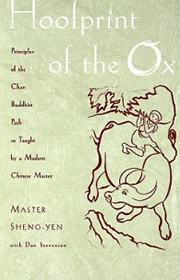
Hoofprint of the Ox: Principles of the Chan Buddhist Path as Taught by a Modern Chinese Master
Drawing its title from the famous ox-herding pictures that symbolize enlightenment as the search by an ox-herder for his wayward ox, Hoofprint of the Ox is an inspirational guide to the self-discovery that is possible through Chan practice. Master Sheng Yen shares his wisdom and teachings in this first comprehensive English primer of Chan -- the Chinese tradition of Buddhism that inspired Japanese Zen. Often misunderstood as an obscure system of paradoxes, the Chan path leads to enlightenment through apparent contradiction. While demanding the discipline of traditional Buddhism, Chan asserts that wisdom (Buddha-nature) is innate and immediate in all living beings, and thus not achieved through the strictures of religious practice, but through dropping all attachments and clinging that obscure our true self-nature.

Illuminating Silence: The Practice of Chinese Zen
This comprehensive work provides an unusual introduction to the practice of Chan by Master Sheng Yen based on talks given during two intensive retreats at the meditation center of the Western Chan Fellowship in Wales. It provides a basic handbook for all concerned with an effective training of Chan for the West with especial reference to the little known practice of Silent Illumination. In his foreword Stephen Batchelor writes: "The discourses are lucid and direct, drawn widely on the sources of Chinese Buddhism, and speak in a refreshingly modern idiom. Perhaps because the settings were relatively small and intimate, the gentleness, warmth and humor of Master Sheng Yen radiate throughout the text".

Ox Herding at Morgan's Bay
The Sheng Yen is a teacher of Ch'an(Zan) Buddhism He has received transmission in the two major branches of Ch'an: the Lin-chi (Rinzai) and Ts'ao-tung (Soto) schools At present, Master Sheng Yen divides his time between New York City, where he is the Resident Teacher at the Ch'an Meditation Center and Taipei, Taiwan, where he is the abbot of two monasteries ”The Ten Ox Herding Pictures provide an analogy to help explain the process of Ch'an practice The ever-watchful, ever-patient of herder is a model for Ch'an practitioners, who should constantly watch their minds of vexation…”
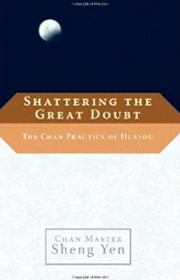
Shattering the Great Doubt
Huatou is a skillful method for breaking through the prison of mental habits into the spacious mind of enlightenment. The huatou is a confounding question much like a Zen koan. Typical ones are "What is wu [nothingness]?" or "What was my original face before birth-and-death?" But a huatou is unlike a koan in that the aim is not to come up with an answer. The practice is simple: ask yourself your huatou relentlessly, in meditation as well as in every other activity. Don't give up on it; don't try to think your way to an answer. Resolve to live with the sensation of doubt that arises, and it will pervade your entire existence with a sense of profound wonder, ultimately leading to the shattering of the sense of an independent self.
Master Sheng Yen brings the traditional practice to life in this practical guide based on talks he gave during a series of huatou retreats. He teaches the method in detail, giving advice for dealing with the typical pitfalls and problems that arise, and answering retreat participants' questions as they experience the practice themselves. He then offers commentary on four classic huatou texts, grounding his instructions in the teaching of the great Chan masters.
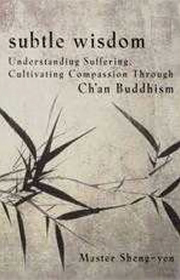
Subtle Wisdom
Master Sheng Yen, a Dharma descendant of the founders of Buddhism in China, considers the concepts of suffering, enlightenment, and, compassion, and briefly recaps the history of Buddhism in China. But he goes beyond these issues to discuss contemporary matters and questions he has encountered in his years of teaching in the United States. Sometimes personal and always instructive, Sheng Yen's introductory work is perfect for those just coming to Buddhism, and for those who are already very familiar with the Tibetan and Zen schools.

The Method of No Method
Here is a spiritual practice that is simple enough for anyone to learn, yet rich enough to be worked with for a lifetime. The traditional Chan (Chinese Zen) practice called Silent Illumination begins with simply putting aside all thoughts except the awareness of oneself “just sitting.” The practice is so simple in execution that it has sometimes been called the “method of no-method,” yet to master it, the practitioner must first grasp the method in order to learn how to let go of it. When fully penetrated, this radical form of emptying one's busy mind-stream leads to perception of the vast ocean of pure awareness. Silent Illumination is closely related to the Japanese Zen practice called shikantaza, and Master Sheng Yen's teachings on it will be of great value to Zen students as well as to Buddhist practitioners of all the traditions.The book, based on talks the author gave during retreats, begins with instruction in Silent Illumination practice with detailed discussion of method, approach, and how to deal with difficulties that arise. Master Sheng Yen then proceeds to provide commentary on a well known Chan text that illuminates the practice and the philosophy behind it.

The Poetry of Enlightenment
"To my knowledge there are no anthologies of Chan poetry in Chinese, Japanese or English which describe in detail the method of practice and the experience of Chan. Furthermore, there are few prose sources in English dealing with the same topics. The purpose of these poems is to specifically show you how to practice, what attitudes to cultivate and what pitfalls to beware of. Finally, they attempt to describe the ineffable experience of Chan itself. These poems flow directly from the minds of the enlightened Chan masters. They include works by Shih Wang Ming, Master Fu, Seng Ts'an, Niu T'ou Fa Jung, Yung Chia Hsuan Chueh, Shih T'ou Hsi Ch'ien, Tung Shan Liang Chieh, and Han Shan Te Ch'ing." We get a glimpse into their experience at the time of, and after their enlightenment. -- Chan Master Sheng Yen
Chan Master’s Discourse

Faith in Mind
In Faith in Mind Chan Master Sheng Yen (b. 1930) comments on the revered Chinese Buddhist text, the Xinxin Ming (Faith in Mind), by the third patriarch of Chan, Sengcan (d. 606 C.E.). Only a few pages long, the Xinxin Ming expresses profoundest truths about the enlightened mind. Master Sheng Yen approaches this poem as more than philosophy; he also sees it as a practical guide to meditation practice. He says, "True faith in mind is the belief grounded in realization that we have a fundamental, unmoving, and unchanging mind. This mind is precisely buddha-mind".

Song of Mind: Wisdom from the Zen classic Xin Ming
"No words can explain enlightenment," says the seventh-century Chan classic Xin Ming (Song of Mind) by Chan Master Farong (594-657). Even so, this poem wonderfully expresses what cannot be expressed in words. In his commentary, Master Sheng Yen takes the austere language of the Xin Ming and reveals to us its still-vital inner meanings. But his ultimate purpose is practical: to show us how to approach Chan meditation, how to deal with problems arising in practice, and how to integrate Chan into every aspect of one's life. The book is based on a series of 7-day intensive Chan retreats with Master Sheng Yen that took place over several years. Each chapter consists of a commentary by Master Sheng Yen on a section of the poem, thus guiding us stanza-by-stanza through this classic of Chan literature. The result is an intimate feeling of being there as he brings this classic to life.
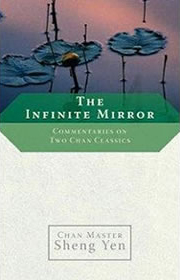
The Infinite Mirror
Here is the inimitable Master Sheng Yen at his best, illuminating the ancient texts of the Chinese Zen tradition to show how wonderfully practical they really are, even for us today. The texts, written by two of the founders of the Ts'ao-tung sect of Chan Buddhism, are poems entitled Inquiry into Matching Halves and Song of the Precious Mirror Samadhi. Both emphasize the Chan view that wisdom is not separate from vexation, and both speak of the levels of awareness through which one must pass on the way to realization. Both are also works of Buddhist philosophy that can serve as guides to spiritual practice for anyone.

The Sword of Wisdom: A Commentary on the Song of Enlightenment
The Sword of Wisdom is an insightful commentary by Master Sheng Yen on the Song of Enlightenment, a classic Chan poem by Master Yung-chia (618-907) that speaks of the proper methods and attitudes of Chan (Zen) practice. In the deepest sense however, the Song of Enlightenment is no less than a roadmap to enlightenment. Yung-chia speaks of the thoroughly enlightened person as someone who has "nothing to learn and nothing to do". In his commentary to Yung-chia's poem, Master Sheng Yen explains to us what that means and what a practitioner should do to attain the freedom of mind that the poem celebrates. Compiled from a series of lectures delivered during intensive 7-day meditation retreats, Master Sheng Yen's lucid commentary offers fresh insights into a timeless philosophy that will benefit and inspire all those interested in Buddhism.
Dharma for Daily Life
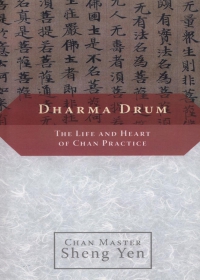
Dharma Drum
In Dharma Drum, Master Sheng Yen offers fresh insights into the ways we can bring Chan study and practice into our daily lives. Part One includes anecdotal explanations of the history and concepts that shaped Chan Buddhism, along with careful explanations of methods for meditation and other practices. Part Two pulls us into the rhythms of practice itself, with aphorisms and bits of guidance for people at any level of practice.
"In Buddhism, awakening from the long dream of life means realizing your self-nature. ... Although we may understand that our lives are dreamlike, we still bear responsibility for this sleeping and waking dream". -- Chan Master Sheng Yen

Zen Wisdom
In Zen Wisdom Chan Master Sheng Yen answers questions from his students with clarity, humor, and depth. Collected over several years, these conversations focus on the simple yet seemingly elusive principles of Chan (Zen) practice. The questions deal not only with the philosophical foundations of Buddhism, such as "What is the self?" but also with issues such as how to practice meditation in daily life. Combining Buddhist wisdom with informed knowledge of contemporary life, Master Sheng Yen shows us that the Buddha's teachings are still fresh and relevant today.
Buddhadharma

Orthodox Chinese Buddhism
As a long-time monk, scholar, and founder of monasteries in Asia and North America, Master Sheng Yen is uniquely qualified to explain the correct — therefore “orthodox” — beliefs that have guided Chinese Buddhism for over 1,500 years. Written while the author was on solitary retreat, OCB was Master Sheng Yen's response to many questions he received about Chinese Buddhism. Using a question-and-answer format, the book explores a wide range of subjects, from what it means to be a Buddhist to sudden enlightenment. This English translation is therefore a welcome addition to the Western literature of Buddhism, and includes new annotations, appendixes, and a glossary designed for the Western reader.
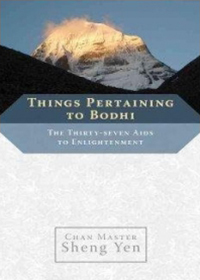
Things Pertaining to Bodhi
The Thirty-seven Aids to Enlightenment are a set of fundamental teachings of Buddhism in the form of a list. The list's seeming simplicity belies the fact that it is in fact a kind of road map to enlightenment for anyone who follows it with diligence and sincerity. The Thirty-seven Aids comprise seven practices conducive to awakening. Each of the seven practices is itself a set of elements, which add up to the total of thirty-seven: (1) The Four Foundations of Mindfulness, (2) The Four Proper Exertions, (3) The Four Steps to Magical Powers, (4) The Five Roots, (5) The Five Powers, (6) The Seven Factors of Enlightenment, and (7) The Noble Eightfold Path.
Master Sheng Yen's down-to-earth teachings take the reader on a progression through each of the practices—many of which are familiar to all major schools of Buddhism—illustrating how they relate to the reader's own practice on the path toward enlightenment.
Sutra Commentaries
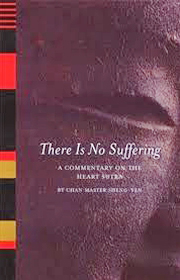
There is No Suffering: A Commentary on the Heart Sutra
There Is No Suffering is Chan Master Sheng Yen's commentary on the Heart Sutra , the most widely recited and studied among the Mahayana scriptures. Only some two pages long in English translation, the Heart Sutra evokes the complete spirit of Mahayana Buddhism, which is that while phenomena exist they are fundamentally transient and without enduring self, that underlying all sentient experience is "true suchness", or Buddha-nature. Master Sheng Yen speaks about the sutra from the point of view of Chan practice and presents it as a series of contemplations, encouraging readers to experience it directly through meditation and daily life. In this way, experiencing the Heart Sutra is not merely intellectual, but also method of contemplating our own reality and ultimately awakening to our own inherent Buddha-nature.

Complete Englightenment
Complete Enlightenment is the first authoritative English translation and commentary on The Sutra of Complete Enlightenment , a central Mahayana text that shaped the development of East Asian Buddhism and Chan. Master Sheng Yen incisively applies the sutra to practice in contemporary life. The central theme of this book consists of penetrating dialogues between the Buddha and twelve illustrious bodhisattvas on the nature of enlightenment. Each of the bodhisattvas is an enlightened being who epitomizes the ideals of Mahayana Buddhism, the Middle Way of vowing to help all sentient beings while on the path to buddhahood.
" The Sutra of Complete Enlightenment is a Dharma dialogue between the Buddha and several great bodhisattvas in the presence of a large Sangha. If you know how to be there and how to listen, you will be able to actually participate in it. It is still going on."--Thich Nhat Hanh